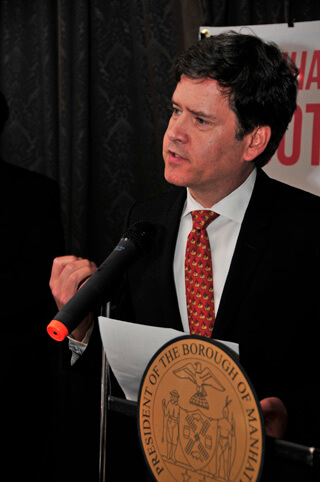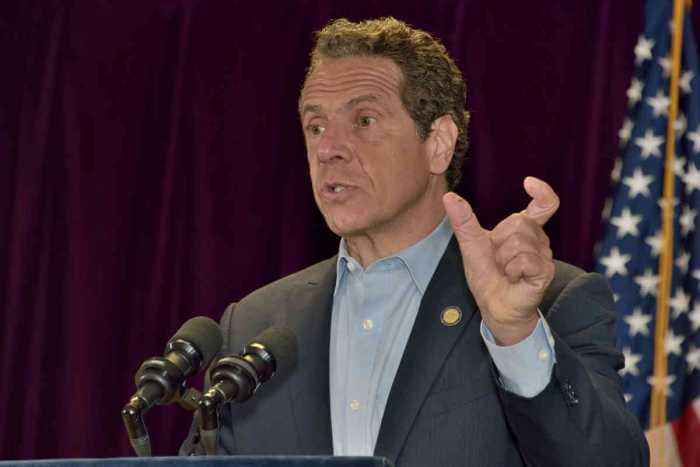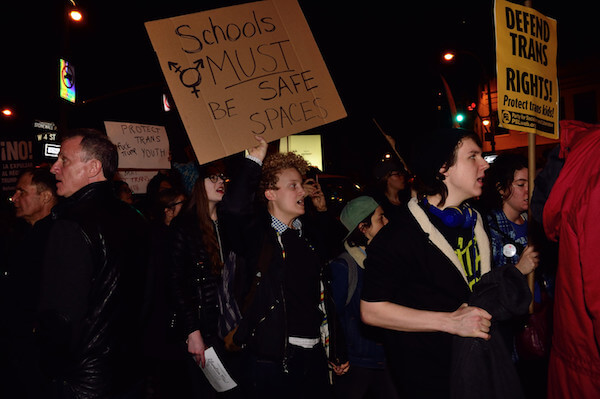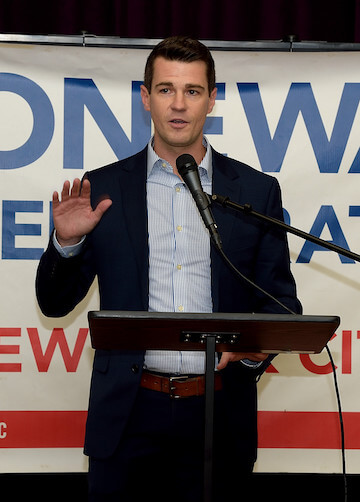Nathan Schaefer, ESPA’s executive director, says there is no excuse for the Senate’s inaction. | GAY CITY NEWS
BY PAUL SCHINDLER | The New York State Legislature went into 24-hour overtime on June 20 to conclude its regular 2014 session, but the State Senate still did not find the time or will to approve two bills of vital interest to the LGBT community.
After a campaign of nearly a dozen years, the Senate once again did not take up the Gender Expression Non-Discrimination Act, which would extend the civil rights protections given gay and lesbian New Yorkers in the 2002 Sexual Orientation Non-Discrimination Act to the transgender community. GENDA has been approved seven times by the State Assembly, where it is sponsored by Manhattan Democrat Dick Gottfried.
And, the Senate also failed to act on a measure — widely viewed as having the votes necessary for passage — that would bar mental health professionals licensed by the state from performing “sexual orientation change efforts” (SOCE) on minors. The ban on such treatment — sometimes dubbed “reparative therapy” — would also apply to efforts to change the gender self-identification and expression of underage New Yorkers. The bill would not apply to counselors, such as religious advisors, not licensed by the state to carry out mental health treatment.
The SOCE ban won approval from the State Assembly by an 86 to 28 vote on June 16.
State Senate refuses to move on key LGBT goals despite support on the floor, Assembly passage
“There is no reason why these two bills critically important to the lives of LGBT New Yorkers did not pass in the Senate this session,” said Nathan Schaefer, the executive director of the Empire State Pride Agenda (ESPA), the state’s leading LGBT advocacy group. “The failure of the Senate leadership to bring these bills to the floor for a vote leaves thousands of transgender New Yorkers vulnerable to discrimination in their homes, on the job, and on the streets of their own neighborhoods. And children are left susceptible to harm in the offices of so-called therapists licensed by the State of New York.”
The SOCE measure, sponsored by two out LGBT Manhattan Democrats, Senator Brad Hoylman and Assemblywoman Deborah Glick, is modeled on legislation enacted in the past two years in California and New Jersey.
The California law, adopted first, faced two court challenges from SOCE practitioners on the grounds that it violated their free speech rights, but last August a federal appeals court upheld the statute, distinguishing between the rights practitioners enjoy to advocate for the practice in public debate and the limitations on the therapeutic practices they can employ in their professional conduct governed by state licensing.
Advocates emphasize that leading professional groups — including the American Psychological Association, the American School Counselor Associations, the American Academy of Pediatrics, the National Association of Social Workers, and the American Academy of Child and Adolescent Psychiatry — agree that SOCE, in treating homosexuality and gender nonconformity as mental illnesses in need of cure, actually increases mental health risks for young people in terms of depression, substance abuse, and suicide.
In his comments about the Senate’s failure to act, ESPA’s Schaefer referred to those engaged in SOCE as “quack therapists.”
The Pride Agenda and Hoylman, on the Senate side, were also keen to point out that the measure only applies to mental health professionals who must be licensed in the ordinary course of business. It would have no effect on a religious practitioner engaged in “pray-the-gay-away” types of efforts. As last year’s federal appellate ruling in the California case noted, even licensed mental health professionals would remain free to argue in favor of SOCE in the public square, and they can refer their minor patients to non-licensed SOCE programs.
According to one source familiar with the effort to pass the bill, despite the unambiguous limits on it, Senate Republican leaders pointed to concerns some religious communities voiced about their freedom to counsel young people unfettered by the state. No such group, however, made a public statement in opposition to the bill.
State Senator Brad Hoylman said a change in Senate leadership is needed. | DONNA ACETO
Schaefer and Hoylman were clearly frustrated with the Senate’s failure to move the SOCE measure, both of them having been upbeat about the prospects for victory in a floor vote.
“We had a very firm vote count,” Schaefer said. “We were confident that we could win that vote.”
ESPA identified three Republican supporters, and Schaefer noted that Long Island Republican Jack Martins’ decision a few days before the end of session to add his name as a co-sponsor was “the first time in recent memory” that an LGBT measure had a GOP co-sponsor.
For Hoylman, the leadership’s refusal to give him a vote capped two years of mounting exasperation that he and his Democratic colleagues have with the governing coalition that runs the Senate. Democrats won a majority of the seats in the 2012 election, but a rump faction of five from that party formed the Independent Democratic Conference (IDC), which joined the Republicans to put together a majority.
“The bottom line is until we change the leadership of the State Senate, New Yorkers can continue to expect forward-thinking bills to stall,” Hoylman said. “Add conversion therapy to the pile of failed progressive initiatives in the Senate, which includes a decent minimum wage, codifying a woman’s right to choose, the DREAM Act, the Gender Expression Non-Discrimination Act, and others.”
Governor Andrew Cuomo, as part of his agreement with the Working Families Party to garner its endorsement, pledged to help Democrats win a clear majority in November’s elections. That, in turn, has prompted speculation that the IDC might be prepared to rejoin the Democratic ranks. [Editor's note: After this story was published on June 25, an agreement under whichthe IDC would rejoin the full Democratic Conference was announced.] At the same time, fueled by anger at the obstacles he argues the IDC poses for progressive issues, Oliver Koppel — a former member of the City Council and State Assembly who 20 years ago served a brief stint as state attorney general — is mounting a September primary challenge to the conference’s leader, Jeff Klein, who represents portions of the Bronx and Westchester County.
Klein’s office did not respond to queries from Gay City News toward the end of the session about the prospects for movement on the SOCE ban. Schaefer noted that all five IDC members had endorsed both that bill and GENDA, and that all but Klein had signed on as co-sponsors. Two IDC members, Staten Island’s Diane Savino and Tony Avella of Queens, he said, were helpful in the push to win a vote for the SOCE measure.
On June 19, the day the Senate was originally scheduled to wind up business, Avella told Gay City News that a vote on the SOCE ban was “definitely possible” before the end of the session and that the bill remained an IDC “priority,” but that “there are a lot of bills in the mix and the more that are in the mix, the more difficult it is.”
Unlike Hoylman’s SOCE bill, there was little last-minute drama regarding GENDA, which is sponsored by Lower Manhattan-Downtown Brooklyn Democrat Daniel Squadron. It had long been clear that it would not be moving this year, Schaefer acknowledging the “unfortunate” reality that “some in the Legislature think a community only gets one thing a year.” (He noted, as well, that this year the LGBT community got neither GENDA nor the SOCE ban.)
GENDA has had a troubled history in the Senate. The only time it came close to getting a floor vote was 2010, when advocates were confident of victory but were blocked by Republicans from getting the approval needed from the Judiciary Committee. With changes in the Senate’s membership. GENDA’s boosters are less assured they have the floor votes now.
“I was worried if it got to the floor, it might not have the votes,” Schaefer acknowledged, “but this is a bill the community has been working on for 12 years and it deserved a vote.”
Squadron, who has in the past voiced the same frustrations as Hoylman about the intransigence of the Senate’s coalition leadership, put the bill’s failure in a larger context.
“Most people are shocked when they learn transgender New Yorkers don’t enjoy the same basic protections that most of us take for granted, including in housing and at their job,” he said in a written statement. “Over and over again — seven times now — the Assembly has done the right thing. It’s time to vote in the Senate on this basic issue of fairness and civil rights.”
Now that the legislative session is over, the Pride Agenda turns its attention to the elections ahead — the primary in September and the general in November. Schaefer would not get ahead of ESPA’s political action committee, saying, “I don’t think that we as an organization have made a determination as to what endorsements we will be making,” but he added, “There certainly is cause to see a need for a change in the composition of the leadership. The current leadership isn’t allowing LGBT bills to get to the floor.”
Taking pains to emphasize the group’s bipartisan posture, Schaefer said, “We have made endorsements of every political affiliation and we may do that again.” He added, however, that the group could get involved in contested September primaries in addition to making general election picks.
As it has done in the past, ESPA is likely to do a rolling series of legislative endorsements, the first ones probably being announced by late July.





































